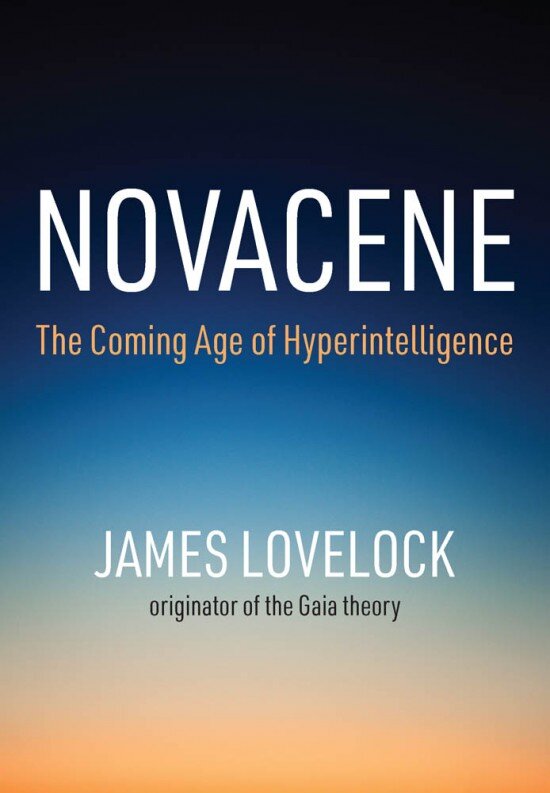Well Read Wednesday: Novacene
James Lovelock, creator of the Gaia hypothesis and the greatest environmental thinker of our time, has produced an astounding new theory about future of life on Earth. For many, this week's choice of book will simply be reflection of my nerdy side. I am old enough to remember reading Gaia: A new look at life on Earth by Lovelock back in 1979 and being completely enthralled by it. The hypotheses had been around for a few years and was causing ructions both inside and outside the scientific community. What struck me most of all was that it was not necessary to believe every word of it but that the world needed brilliant blue-sky thinkers like Lovelock to challenge our thinking. Over the years Lovelock and others modified and refined the theory, making it more and more understandable and believable. Now, on his 100th birthday, this remarkable man has once again challenged our thinking. With this new work, Novacene, The Coming Age of Hyperintelligence, James Lovelock avoids the popular belief that the robots are coming to get us. I have railed against that particular Science Fiction trope ever since the HAL 9000 uttered the famous words I'm sorry, Dave. I'm afraid I can't do that, way back in 1969! In this excellent little book (160pp) we are given a prophetic look at a future in which humans and artificial intelligence together will help the Earth itself to survive. He argues that the Anthropocene—the age in which humans acquired planetary-scale technologies—is, after 300 years, coming to an end. A new age—the Novacene—has already begun.In the Novacene, new beings will emerge from existing artificial intelligence systems. They will think 10,000 times faster than we do and they will regard us as we now regard plants. But this will not be the cruel, violent machine takeover of the planet imagined by science fiction. These hyperintelligent beings will be as dependent on the health of the planet as we are. They will need the planetary cooling system of Gaia to defend them from the increasing heat of the sun as much as we do. And Gaia depends on organic life. We will be partners in this project.It is crucial, Lovelock argues, that the intelligence of Earth survives and prospers. He does not think there are intelligent aliens, so we are the only beings capable of understanding the cosmos. Perhaps, he speculates, the Novacene could even be the beginning of a process that will finally lead to intelligence suffusing the entire cosmos. At the age of 100, James Lovelock has produced the most important and compelling work of his life.Again, this is an hypothesis and must be read as such. Novacene is a very readable book and a welcome breath of optimism at a time of fears and uncertainties. As for James Lovelock, I believe he has more than earned his place not only as one of the greatest scientific thinkers of our time but as one of the true elders of the human tribe.
With this new work, Novacene, The Coming Age of Hyperintelligence, James Lovelock avoids the popular belief that the robots are coming to get us. I have railed against that particular Science Fiction trope ever since the HAL 9000 uttered the famous words I'm sorry, Dave. I'm afraid I can't do that, way back in 1969! In this excellent little book (160pp) we are given a prophetic look at a future in which humans and artificial intelligence together will help the Earth itself to survive. He argues that the Anthropocene—the age in which humans acquired planetary-scale technologies—is, after 300 years, coming to an end. A new age—the Novacene—has already begun.In the Novacene, new beings will emerge from existing artificial intelligence systems. They will think 10,000 times faster than we do and they will regard us as we now regard plants. But this will not be the cruel, violent machine takeover of the planet imagined by science fiction. These hyperintelligent beings will be as dependent on the health of the planet as we are. They will need the planetary cooling system of Gaia to defend them from the increasing heat of the sun as much as we do. And Gaia depends on organic life. We will be partners in this project.It is crucial, Lovelock argues, that the intelligence of Earth survives and prospers. He does not think there are intelligent aliens, so we are the only beings capable of understanding the cosmos. Perhaps, he speculates, the Novacene could even be the beginning of a process that will finally lead to intelligence suffusing the entire cosmos. At the age of 100, James Lovelock has produced the most important and compelling work of his life.Again, this is an hypothesis and must be read as such. Novacene is a very readable book and a welcome breath of optimism at a time of fears and uncertainties. As for James Lovelock, I believe he has more than earned his place not only as one of the greatest scientific thinkers of our time but as one of the true elders of the human tribe.